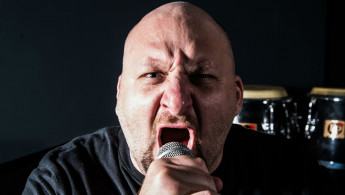Why Hip-Hop? Revolution hits the Arab Spring airwaves
Yet millions of the kingdom's majority young citizens here can perfectly mimic the stars of the genre, backed by a symphony of modern beats, effortlessly battling in rap-karaoke while "vibing" to some of the biggest and most notorious hip-hop artists of all time.
The scene is a strange one for both traditionalists opposing western influence and westerners who believe the entire kingdom remains held by the reins of tradition. But this new surge can be attributed to a powerful yet humble voice that began broadcasting on Saudi airwaves during the peak of the 2011 Arab Spring.
Hassan Ahmad Dennaoui, better known as the Saudi hip-hop guru "Big Hass" is the proud host of his nation's first and only hip-hop FM radio show.
Although the 36-year-old was inspired by old-school rappers in the western world, he dedicates his work to supporting local and regional talents who are able to adapt their art to their own culture - creating something evocative, stimulating and powerful while they're at it.
"Rap is rhythm and poetry and I believe we as Arabs have so much in our history as poets, as believers of the power of the word," he said, "which was why hip-hop was created in the first place.
 |
|
| Big Hass says Arab rappers can draw on centuries of poetic tradition |
"It's also the other way around, having hip-hop popular in the Arab world is very important because it's a self-expression tool. It's a tool an artist would use to reflect their reality, to reflect the truth, which is very important."
In fact, many of the artists featured on the show do just that.
"These were the names that made me believe in the power of the word," he said. These artists "were like news sources to me".
But Big Hass' mission to introduce this genre to Saudi Arabia began years before it was finally broadcast, due to resistance faced from traditionalists that refused to integrate "foreign" ideals into centuries of Arabian culture.
"In 2009, when I began thinking about launching a radio station, Saudi Arabia only had one radio station and it did not play a lot of music," he said.
"So I started broadcasting my own online radio show but it didn't really pick up. For that reason, I began my journey approaching radios in some of the Arab countries, like the UAE, Qatar, Bahrain and Lebanon - but sadly none of the radio stations back then gave me a chance."
Six years later, Laish Hip-Hop? was launched - Big Hass' brand new show on a new youth-oriented channel that provided him with an opportunity to broadcast after no less than six months of debate.
"I managed to make history and launch Laish Hip-Hop? - which means 'Why Hip-Hop?'
"I remember my first broadcast on the radio, I was greeting the audience and welcoming them on my show and the first message I got was 'you're an infidel!'
| Listen: Check out this sample of Big Hass' groundbreaking radio show |
"I still remember how shocked and confused I was, it was at the moment that I realised that this was for me; I truly felt it important to educate the people about hip-hop and its true essence."
Hip-hop artists toppled regimes
For politically and socially active Arabs, 2011 brought an air of enthusiasm, hope and energy. While millions flooded the streets of Tunis, Sanaa, Cairo and other major capitals and cities, millions more engaged in the ongoing debate online - adding their two cents into a global discussion.
Even for those who previously showed no interest in politics, sharing videos, stories, news and updates on social media became a daily duty.
Arguably some of the most shareable content during the wave of uprisings were nationalistic songs designed to inject the spirit of revolution into the hearts and minds of millions. The tracks, accompanied by powerful images of protests, became monumental in some nations, including Tunisia, Libya and Egypt, with many praising the vibrancy of artists and creatives for helping topple decades-old regimes.
"We saw El-General from Tunis, we also saw Emel Mathlouthi, who was the voice of the Tunisian uprising," Big Hass remembers. Ramy Essam was a "truly monumental voice that eventually had to leave Egypt".
Six years on, many activists, writers and organisers are reassessing the lessons of 2011 - and in some cases, continuing the fight for political and social reform, despite facing mass crackdowns from their respective governments.
But although it can sometimes be disregarded, it's important to note hip-hop too had its contribution to the moment that was, and is, redefining the course of the Arab Spring and the culture of the Arab world.
Follow Hassan on Twitter @BIG_HASS and tune in to his radio show every Saturday from 10pm KSA (1900GMT) via mixfm-sa.com/LIVE.
And follow Sana Uqba on Twitter: @Sanasiino
This article is part of The New Arab's series on the music of the Arab Spring. If you enjoyed it, check out Hello Psychaleppo, Syria's very own creator of insane psych-techno. Or meet 47 Soul, the Palestinian electro outfit who are big in exile. And hang out with El-Rass, Tripoli's underground rap hero. And watch out for more...
Join the conversation: @The_NewArab


![President Pezeshkian has denounced Israel's attacks on Lebanon [Getty]](/sites/default/files/styles/image_684x385/public/2173482924.jpeg?h=a5f2f23a&itok=q3evVtko)



 Follow the Middle East's top stories in English at The New Arab on Google News
Follow the Middle East's top stories in English at The New Arab on Google News


